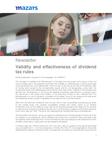
Validity and effectiveness of dividend tax rules
Validity and effectiveness of dividend tax rules
The concepts of "validity" and "effectiveness" of the legal norm are proper to the theory of law, but such concepts land in the practical world when the invalidity or ineffectiveness of those same legal norms generates their unconstitutionality. That is to say, a rule may be formally and materially valid, for having been issued by the corresponding organs and for not disregarding -prima facie- the fundamental rights of the addressees, and it may be -at the same time- ineffective. Its ineffectiveness derives from not producing, or not having the aptitude to produce, legal effects or consequences in the real world. In this sense, Hans Kelsen, in his book Pure Theory of Law, indicates that "The effectiveness of a rule is, therefore, a condition of its validity" since "a rule ceases to be valid when the individuals whose conduct it regulates do not observe it to a sufficient extent".
When the rule becomes ineffective, that is to say, when it has no possibility of producing any effect on the outside world, such situation immediately conflicts with certain norms of our Political Constitution such as the validity of a just order as an essential purpose of the State (Art. 2), the duty of nationals and foreigners to abide by the law (Art. 4) and the duty of judges to submit their decisions to the rule of law (Art. 230). Therefore, the challenged rule naturally becomes unconstitutional.
This theoretical introduction serves as support to indicate why the third paragraph of article 48 of the Tax Statute is unconstitutional, which indicates that "profits from investment funds, securities funds managed by stock brokerage firms, mutual investment funds and employee funds obtained from their affiliates, subscribers or associates are assimilated to dividends".
In Official Letter No. 013279 of May 30, 2017, the Dian, after an analysis of the above-transcribed rule concluded that "(...) the final subsection of Article 48 of the ET is not applicable to the profits distributed by collective investment funds. Consequently, the same are not taxed with income tax and complementary income tax by way of dividends. (...) For the CIF, in matters of income tax and complementary income tax, the principle of transparency continues to prevail in the terms of articles 23-1 and 368-1 of the ET; and 1.2.4.2.2.78 and following of Decree 1625 of 2016 (...). Consequently, Concept 06230 of March 22, 2017 is revoked and it is concluded that the income obtained through a collective investment fund by a natural person resident in the country has the treatment it would have if the activities that originated them had been developed by the natural person (...)".
Although the position of the Dian is shared in this respect, it is evident that the rule established in the third paragraph of article 48 of the Tax Statute, although valid, is ineffective. And its ineffectiveness entails, naturally, its unconstitutionality, since it conflicts with the aforementioned constitutional norms that order compliance with the law by nationals and foreigners, the mandate that judicial decisions be based on the same and the validity of a just order as an essential purpose of the State.
The declaration of unconstitutionality of this type of rules that have lost their effectiveness would have a purifying and decongesting effect on the law, since it makes no sense whatsoever to keep rules in the legal system that the same supervising entity considers inapplicable.


